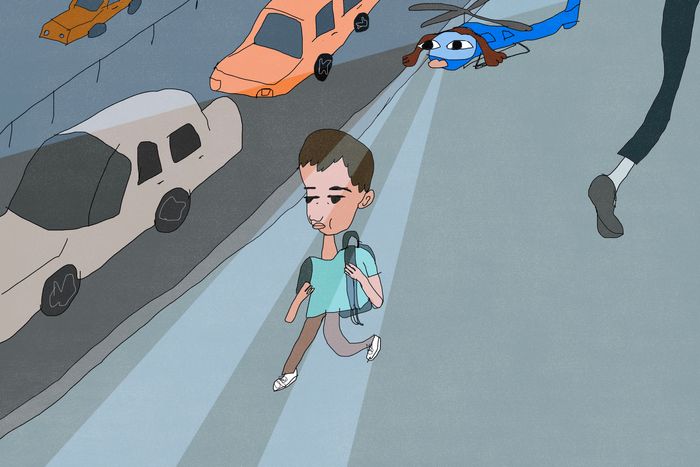
This article originally appeared in Brooding, a newsletter delivering deep thoughts on modern family life. Sign up here.
The other evening, I was over at my friends’ place and we were comparing notes on our seventh-graders. Like in New York City, seventh grade in Montreal marks the traditional start of solo commuting on public transit. My friends’ kid has had some trouble adapting to the logistics of getting around alone. For a while, a parent would ride the bus with him, but he wanted to be more independent. He switches buses on the way to school, and that was the tricky part that needed practicing.
So for a week of morning commutes, his stepdad tailed the bus on his bike, pedaling the snowy Montreal streets to make sure his stepson got off where he was supposed to. One morning, the kid missed his stop, and my friend had to race the bus, ditch his bike at the next stop, and rush on to get him. But now he’s riding alone every morning, a seventh-grader making his way.
As my kids get older, I am learning how labor-intensive it is to teach them to be independent, and I’m beginning to think that we have the helicopter-parent/hands-off-parent binary all wrong. Maybe helicopter parenting is a form of neglect, one that might even be comparable in its harmfulness to the kind of neglect that forces kids to grow up by their own wits. The crisis of teen mental health in the wake of COVID can be explained in all sorts of ways, but a common denominator is that many teenagers feel that they have no control over their lives, which is distressing for any human. When you teach a kid to be safely independent, you give them some of that control. Denying a kid that opportunity is cruelty disguised as parental virtue – it’s beyond fucked up and dark, when you really think about it.
I also wonder if we misunderstand some of the motivations for helicopter parenting. We assume it’s an anxiety response, and I’m sure that explains a lot of it, but it’s also the path of least resistance. I’m not one to call people out for being lazy — in Montreal, we prefer to call it “l’art de vivre” — but I might have to make an exception here.
“Sometimes it’s harder to parent your kids to become independent than it is to helicopter — it can be exhausting, and it can be time-consuming,” said Dr. Gail Saltz, clinical associate professor of psychiatry at New York-Presbyterian Hospital and host of the How Can I Help? podcast from iHeartRadio. As counterintuitive as it may seem, letting kids make mistakes, and being there to support (and clean up after) them, can be more work than doing everything yourself. “Your kid will leave the house with their shoes on the wrong feet, and you’ll think, The teacher’s going to see this; what will they think?” said Dr. Saltz. But the teacher has seen it all, and the kid will realize their feet hurt and figure out that they need to switch their shoes. “Little kids need little tasks,” said Dr. Saltz — like putting on shoes, brushing their own teeth.
Many parents instinctively intervene in these simple tasks, but it sets a precedent that can be hard to break later on. It takes a long-term oceanic presence of mind to teach kids independence. It’s not a set of tasks but an entire orientation that has to be maintained over the course of years. Repetition, correction, being available to help if something goes wrong — this is what teaching kids independence requires of us.
“Parents who are very involved, wanting to know what their child is doing in the world — that is often considered part of helicopter parenting, but that isn’t necessarily a problem,” said Saltz. “Being involved is distinct from wanting to help a child make all of their decisions. The problem is ‘I will help you do all the things. I will get involved in your conflicts. I will not let you make any mistakes.’” According to Saltz, even parents of young children should avoid approaching parenting as a troubleshooting exercise. Children become accustomed to this degree of parental involvement. The more time parents spend clearing the path for their offspring, the harder it is for children to adapt to facing obstacles on their own.
For parents who can afford to throw money at their problems by hiring nannies and Ubers to shuttle their kids all over town, being overprotective is probably as much about expediency as it is about actual worry. It’s more convenient to outsource and schedule than to take the time and mental space to help kids handle anything semi-autonomously. But by failing to take the time to teach our kids to navigate a neighborhood (or load a dishwasher, for that matter), we’re prioritizing our own convenience over the long-term benefits for our kids.
Helicopter parenting is also a way of protecting yourself from the judgment of other parents. In fact, its specter can loom even larger than actual threats to children’s safety. The off-piste vigilance of strangers can make an otherwise safe, ordinary situation spiral into conflict and defensiveness.
Fearful and overprotective strangers can even feel like a threat — especially to parents of color, whose kids are more likely to be seen as “loitering” when they’re out in the world. We’ve all read the nightmare stories of mothers having their children put into foster care because their poverty was mistaken for neglect. Many of us have had our own brushes with a stranger on a rampage of carefulness, and it’s enough to make you think twice about letting your kids be independent at a young age.
When my kids were 5 and 2, I was doing fieldwork for my master’s thesis on the weekends while working full time during the week. (Notice how I instinctively position myself as hardworking and overextended so you’ll think I’m a good person worthy of sympathy.) One Sunday in March, I had to conduct an interview at a Tim Hortons, and since my husband was working, I brought the kids. I left them in the car, listening to music they liked — I could see them through the window from where I sat conducting my interview. Wouldn’t you know it, another woman clocked them too. I saw her standing by my car reaching for her phone, and I knew right away It Was Happening. I excused myself from the interview to run outside. She was on the verge of calling the cops, she said, because someone could come grab the kids at any moment. (It’s amazing how abduction by strangers is such a persistent fear among so many parents, when 99 percent of abductors are known to the child they take.) We exchanged words — I instinctively, Canadianly apologized, which I have regretted ever since — and she left.
I’ve thought about that woman for years. She had two teenage daughters with her, who witnessed the whole exchange. No doubt, as they drove away she reiterated to them that she would never have been so negligent with them when they were young. She was demonstrating fitness to them, responsibility, moral fortitude. But nothing had actually happened — no one had been in danger, and no one was saved. Sometimes, I think that as the world becomes increasingly complex and overfull of information, confused people seek out opportunities to feel like they have some idea of what’s going on. The vulnerability of children, as a concept, is not confusing. And that’s how we have found ourselves in a situation where children are overpoliced by strangers in public and parents consider it their duty to protect their kids from obstacles real and imagined.
We really owe it to ourselves and to our kids not to let our style be cramped by the threat of overzealous idiots on the hunt for opportunities to create order in their world. My kids have always been a bit more on the loose than average, and I’ve long harbored a shameful worry: If anything ever happened to them while roaming the neighborhood alone, not only would it be horrible for our family, but it would prove the anxious side right — and I would hate to have to live that down.
It doesn’t take only energy and attention to teach your kids to navigate independence safely. It takes a certain willingness to accept that someone out there might think you’re a bad parent. Allowing imagined judgment to cloud our decision making is like letting an internet comments section make our choices for us. Helicopter parenting is the manifestation of overlapping anxieties about the hazards of the world and about the opinions of other people. It’s also a product of the narcissistic delusion that our children’s (inevitable, developmentally necessary) failures are our own.
This newsletter has never been about giving advice, and I’m not about to start now, but I do have one request to make of all you city-dwelling readers. Next time you see a kid you know walking down the street by themselves, don’t ask them where their parents are. Ask them where they’re headed.
More From This Newsletter
- Why Do Parents Obsess Over Kids’ Athletics?
- The High Stakes of the Group-Family Vacation
- How Do French Parents Raise Their Teenagers?





